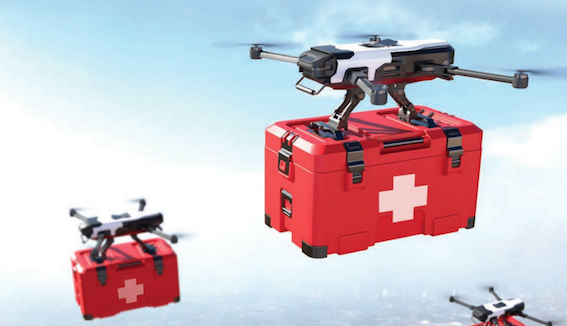Providing Succour By UAVs
July 01, 2022 | Friday | Features | By Sanjiv Das
Drone technology has ceased to being just a mere fanciful and impractical aspect of Hollywood blockbusters, making headway into almost every aspect of modern industries and services. Naturally, healthcare isn't far behind in leveraging this nifty and reliable tech to its advantage. Let's see how deep has been the penetration of this aerial supply chain wonder gadget.
image credit- shutterstock
Drones also referred to as unmanned aerial vehicles (UAV), are slowly making their presence felt in the healthcare sector. Gone are the days when sending emergency life-saving medicines to the remotest part of the country was unthinkable and would take days to reach. With the advent of drone technology and healthcare and medtech companies adopting it in a new way plus the government’s push, has opened a new era for drones in the health sector.
The usage of drones in the healthcare industry is becoming a new norm that is set to bring in a revolution in the sector. The drone technology in healthcare, previously envisioned for aerial and military use, is touted to become the future of healthcare. With the advent of drones, it is possible to deliver blood, vaccines, birth control, snake bite serum and other medical supplies to rural areas, where it can reach the victims who require immediate medical attention within minutes. The need for drones was more relevant when COVID-19 vaccines were transported to remote corners during the pandemic. Though worldwide drones have been used in the healthcare industry for quite some time, India is slowly adapting drones to ensure the last mile delivery of medicines, vaccines etc.
The drone market
According to a recent report from FICCI and EY, there are estimates that the drone market in India will surpass $900 million in the next two to three years. A report by 6Wresearch states that the Indian UAV market is poised to grow at a CAGR of 18 per cent during 2017–23, in terms of revenue. BIS Research predicts that the market for commercial drones superseded the military market by 2021, cumulatively hitting approximately $900 million.
The Indian Council of Medical Research (ICMR) recently released ‘Guidance Document for use of Drones in Healthcare’. The institute has published the document based on the field experience in Manipur and Nagaland. The objective of this document covers areas such as how to obtain regulatory approvals from competent authorities for various kinds of drones and utilising air space for delivering medical supplies restricted to medicines, vaccines and surgical materials.
Amber Dubey, Joint Secretary, Government of India, Ministry of Civil Aviation, says, “Reforms in the drone sector have been well received by our startups, industry, academia and people at large. I compliment ICMR for their stellar role in conducting experimental drone-based vaccine deliveries in the North East region and Andaman islands.”
According to ICMR, the longest drone flight under this project carried 3525 units of medical supplies from Mokokchung to the district Tuensang in Nagaland (approx 40 km). A total of 17,275 units of medical supplies were delivered through drones in the states of Manipur and Nagaland.
The ‘Guwahati Declaration,’ unveiled by Dharmendra Pradhan, Union Minister of Education, Entrepreneurship and Skill Development and Dr Himanta Biswa Sarma, Chief Minister of Assam during North East Research Conclave (NERC) 2022 mentioned drone technology development and application during where IIT Guwahati is going to play a major role.
Click here to read the full story....









